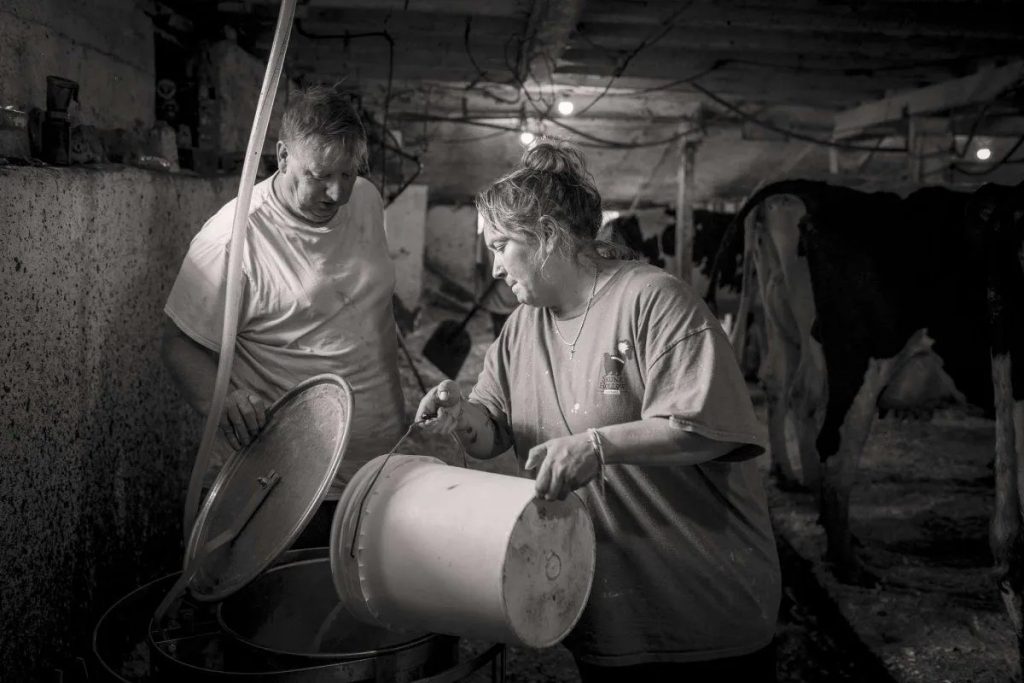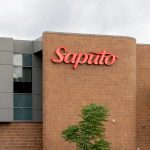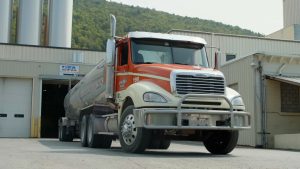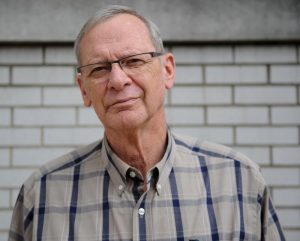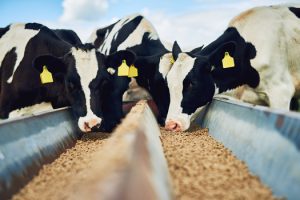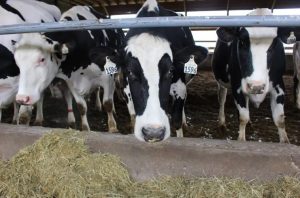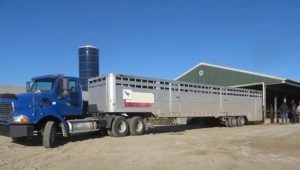
By paying top dollar for milk and sourcing within 15 miles of its creamery, Jasper Hill supports an entire community.
A Friday Evening Milking Session at Tom’s Barn
Every Friday at around 6 p.m., farmers in Greensboro, Vermont, descend on Tom Hill’s barn to help out with the Friday evening milking session. As udders are emptied and beers popped open, they catch up on each other’s families and talk about the joys and struggles of the vocation they share.
The weekly gathering is a community tradition. The bonds between these farmers, formed over many decades and spanning multiple generations, have become even more precious as farms consolidate or close—farm numbers have been declining since the 1970s, and that transformation of rural life continues. This tight-knit community holds on with determination, cherishing its camaraderie.
Many here have benefited from their collaboration with cheesemakers Mateo and Andy Kehler, founders of Greensboro’s Jasper Hill Farm. The Kehlers pay their suppliers nearly twice the global market rate for milk, and they source exclusively from within a 15-mile radius of the creamery. This commitment both sustains local agriculture and reinvigorates the community by fostering an interconnected local economy.
The Kehlers’ business model has proven remarkably successful: 82 cents of every dollar of profit stays within Vermont, with 62 cents staying in Greensboro itself, making it one of the most financially rewarding places to be a farmer in the United States.
Tom Hill might not still be in business if it weren’t for Jasper Hill. Other dairy farmers are in the same situation. Knowing that Jasper Hill pays a fair price for their milk, some farmers have relocated to Greensboro specifically to work with them.
Chet and Renee Baker, for instance, moved here from Richmond, Vermont, so they could be within Jasper Hill’s 15-mile radius. “[They] understand the importance of a small farm [and its] impact in the community,” says Renee. She and her husband now supply milk to Jasper Hill.

Butch Greaves, 80 (left), is a family friend of the Hills’. “I grew up on the home farm and started milking and doing field work when I was 10, when I wasn’t in school,” he says. In 1969, when the Walden Fire Department near Greensboro was founded, Butch became a charter member and still volunteers today. Alex Putvain, Tom’s neighbor, has worked on Tom’s farm his entire life. Photo by Jake Price

Mateo Kelher jokes with Tom Hill. When the Kehler brothers were starting out, they’d ask Tom for advice. Photo by Jake Price

New residents to Greensboro, many of whom work from home, discard perfectly usable furniture. Tom collects these items from the roadside and repurposes them in his barn for people to use during the milking sessions. His daughter Emily says: “My father grew up very different than people do now, with not a lot of money and not a lot of things. [When he sees] stuff get thrown out, stuff that is perfectly good, why let something so good go to waste? . . . There are always people in the barn, all the time. If anybody wants to see a farm or see how he does things, that’s the place to go. He is such a welcoming person, and so he’s always got chairs for people to sit on.” Photo by Jake Price

Angel Putvain, Alex’s wife, with her dog Max on a chair that Tom rescued. Photo by Jake Price

At age 9, Michael Putvain hopes to follow in the footsteps of Butch and his uncle Alex. He cleans Tom’s stalls after school and dreams of farming for the rest of his life. Photo by Alex Price

Lori, Tom’s wife, strokes a cow at the end of its days. Most likely, Lori will have to sell it on the beef market. Photo by Alex Price
The Jasper Hill Approach: Keeping the Profits Local

Jasper Hill Farm in Greensboro, Vermont. Photo by Alex Price
Mateo Kehler has fond childhood memories of visiting Greensboro’s Caspian Lake, which had been a family vacation destination for his father and his grandfather before him. It was “the happy place of our collective family childhood,” he says. Inspired by these memories, he and Andy wanted to move to Caspian Lake in 1998 to raise their families there.
But it was a challenging time for the region. The dot-com bubble was swelling, with tech entrepreneurs moving in, buying farms, and displacing longtime residents. The land that Mateo and Andy loved now belonged to those who weren’t contributing to that land, and the people and families they knew were seeing generations of purposeful livelihoods wiped out. Land prices were rising, too. “It felt like we were just getting priced out of paradise,” says Mateo. “Then a small piece of land opened up in Greensboro, and we jumped at it. We made an absolutely irrational and emotional decision to throw everything we had at the opportunity to own a piece of land here.”
At the same time, the brothers, both carpenters, were yearning for a more meaningful life. Mateo saw how the verdant landscape around him, sculpted by farming, was on the verge of being lost.
The brothers decided to create a business. But it wouldn’t be merely about profit; it would also be about leading a life with purpose at its core. “Jasper Hill grew out of this notion that a whole life is encompassed by three intrinsic needs: meaningful work in a place that you love with people that you love,” says Mateo. “We started with this idea that we need to figure out how to capture more value and retain more value, and take control of price in a way that would give us some agency in the future of our participation in a market system.” Cheese, a value-added product from dairy, fit the bill.
Decades later, Jasper Hill Farm is well known for its artisanal cheeses, some made with organic milk. The Kehlers also created a 22,000-square-foot underground cave-aging system, which they use not only for their own cheeses but those from other local creameries like Cabot Creamery, further strengthening community partnerships.
When we spoke in late May, the commodity market price for Class III Milk was $18.55 per hundredweight (11.63 gallons), but the Kehlers were paying the five farms they were currently working with $31 per hundredweight—in other words, nearly double the commodity price.
The brothers can afford to pay a higher price because they sell cheese at a premium. “We’re building a pipeline to markets where there’s disposable income,” says Mateo. Ironically, some of Jasper Hill’s best customers are those who displaced the longtime farmers in Greensboro—but now their money plays a part in supporting the community. By producing and selling artisanal cheeses directly to specialty retailers and consumers willing to pay premium prices, Jasper Hill was essentially able to bypass the global commodity market.
To quantify how much of Jasper Hill’s revenue is staying within the community, Andy Kehler tracks the creamery’s annual expenses by ZIP code. After porting every invoice into an Excel spreadsheet, he overlays the ZIP codes and amounts from each invoice onto a map of Vermont to help him see where Jasper Hill’s payments are going, and how much. Last year, 82 cents of every Jasper Hill dollar were spent in Vermont, and three-quarters of that money—62 cents—supported Greensboro farmers and other businesses.
Ultimately, Mateo says, commodity cheese, like commodity milk, is priced too low. Jasper Hill sets a higher price for its carefully crafted cheeses, and instead of pocketing a profit for themselves, redistributes the margin to the community by paying higher prices for milk. “[We] balance the value that we can extract from the market,” says Mateo.

Finding Jasper Hill Farm can be challenging, as it is intentionally located off a dirt road with no signage. “We made the decision not to make Jasper Hill a destination, and really keep a low profile. So, we never even put a sign up at the end of the road. I describe Greensboro as being the geographical center of the middle of nowhere,” Mateo says. Unlike other businesses that prioritize rapid growth and maximum profit, Jasper Hill’s strategy focuses on horizontal growth, allowing the farm to expand at its own pace while maintaining its unique identity and authenticity. Photo by Alex Price

At Jasper Hill Farm, the surrounding barns maintain their traditional wooden architecture, but the creamery is fully equipped with modern technology. Photo by Alex Price

Mateo Kehler with his copper-lined cheesemaking vats, purchased secondhand from a Comté cheese producer in France’s Jura region. These new vats have helped Jasper Hill improve and expand production of Alpha Tolman, Whitney, and their newest cheese, Caspian. Photo by Alex Price

Mateo in the creamery’s underground cellar, which has seven specialized vaults, each calibrated to ripen a different type of cheese. The facility provides affinage (cheese-aging expertise), distribution, and marketing services for local cheesemakers. Photo by Alex Price

Greensboro has 811 people, according to the 2020 census, and Jasper Hill employs 87 of them. Photo by Alex Price

After the Friday evening milking session, Mateo visits Tom’s daughter, Emily, at Barr Hill Farm. As large farms increasingly keep their herds indoors, Mateo encourages the farmers he works with to pasture their cows. “This beautiful landscape is produced by the footprint of the farmer on the land. . . . that patchwork of farms and forests [defines] the pastoral beauty of this place.” Photo by Alex Price

Tom’s daughter Emily and her 7-year-old daughter, Emerson, take an evening walk on their farm, Barr Hill Farm.
“I’m fortunate to be able to continue with this tradition of farming, especially in the same town that my family’s been farming for hundreds of years,” says Emily. “It’s sad to see a dying breed, but I feel very lucky to be farming right near my father who gives me guidance and wisdom.” Photo by Alex Price
The Impact of Big Ag
The current challenges faced by dairy farmers in Greensboro and across the U.S. have their origins in the 1970s, largely due to the policies and influence of Earl Butz, who served as Secretary of Agriculture under President Richard Nixon. In 1973, Butz infamously said that farmers should “Get big or get out.” This philosophy encouraged agricultural consolidation and industrialization. As a result, the number of farms in the U.S. began steadily declining.
From 1933 until 1973, farm policy had been largely influenced by New Deal agricultural policies enacted by President Franklin D. Roosevelt. These policies supported farmers by guaranteeing fair prices and discouraging overproduction. Through the 1950s and 1960s, subsequent administrations, both Democratic and Republican, built upon or maintained many New Deal programs. Truman’s Fair Deal followed New Deal principles, Eisenhower supported and expanded programs like Social Security, and Johnson’s Great Society extended New Deal concepts.
Butz’s policies still reverberate throughout American agriculture. According to the 2022 Census of Agriculture, the U.S. dairy industry continues to experience significant consolidation. The number of dairy operations able to sell milk has decreased by almost 39 percent in just five years, dropping to 24,082 farms. In 2020, over 2,500 U.S. dairy farms, representing approximately 7 percent of all dairy operations in the country, were forced to cease operations.
Without a return to pre-Butz policies like those of the New Deal, the U.S. is unlikely to significantly revive small-scale farming. However, Canada, 87 miles north of Greensboro, may offer an example. Under Canada’s supply management system, dairy farmers have secure livelihoods and can pass on their farms to the next generation. And, as Jasper Hill demonstrates, albeit on a localized scale, paying farmers fairly has been extremely successful.
Hillside Homestead Dairy Farm

Renee and Chet Baker of Hillside Homestead Dairy. They’ve supplied milk to Jasper Hill since 2021. Photo by Alex Price
Renee and Chet Baker, of Hillside Homestead dairy farm, exemplify the type of farmers that Jasper Hill supports. Thirteen years ago, when the Bakers began farming in Richmond, about 55 miles west of Greensboro, they recognized the challenges of surviving on the global commodity market.
Little has changed. “The price of milk was the same as it had been back in the ‘80s,” Renee says. “My father probably got paid more for his milk than we did. The price of everything increased, but the price of milk [remained the same].” Realizing that they needed a more sustainable model, they moved to Greensboro and began working with Jasper Hill Farm in 2021. This partnership became crucial for their farm’s viability, as the higher milk prices from Jasper Hill not only improved their profitability but also helped them qualify for loans to establish their own farm.
During the pandemic, Jasper Hill’s innovative pivot to mail-order cheese sales increased their customer base, and the Bakers were able to sell more milk than initially anticipated. “COVID actually gave us some innovations. When the markets opened back up, they (Jasper Hill) had the best of both worlds,” Renee says. Jasper Hill’s premium prices for milk have largely insulated Hillside Homestead from the volatility of the global commodity market. “In the commodity market, you don’t know what you’re getting until you get your paycheck,” says Renee. “The price is different every time.” They still face the uncertainties of supply and demand within their partnership with Jasper Hill, but paychecks are basically stable.
Learning from Jasper Hill’s value-added approach, the Bakers’ long-term goal is to launch their own ice cream line, diversifying their income and giving them more control over their farm’s future.

Renee and Chet’s place in the community transcends farming, underscoring the importance of small farmers. Last summer, Renee witnessed flooding that she describes as “unreal” and unlike anything she’d seen in her lifetime. The community found itself cut off. “Greensboro and Hardwick were trashed. All the roads were washed out,” Renee recalls. Larger farms relying on computers went offline. “The thing about us is there’s always food here.” This hands-on experience and ability to adapt to challenging situations showcase a type of wisdom and knowledge that can’t be replicated by AI. It’s only through lived experience that this kind of practical resilience and community support can be developed and maintained. Photo by Alex Price

“When people buy my milk, they’re buying my tears, they’re buying my time, my hours spent laboring,” Renee says. “They’re buying my passion, and how much I love doing this. They’re sharing in our success, but they’re also sharing in our failures, like when you lose a cow or something bad happens, like the flooding [that made us go] through financial distress, they’re getting a piece of all of that. You can’t get any closer to that than buying from someone you see face to face. When someone buys our milk, I’m so appreciative, because they’re really contributing to us and they’re putting their faith in us.” Photo by Alex Price

“You don’t have to make an appointment to go meet with a local small dairy,” says Renee. “There’s no open or closed sign. We’ve had people come at like 10 o’clock and go in and get their milk and shut the door, which I think is pretty cool. And I know everybody’s name.” Photo by Alex Price

Greensboro held its annual parade, called the “Funky Fourth,” on July 6. Farmers played the central role in the procession, rolling by on their tractors. Photo by Alex Price

A local farm family riding a large-scale mower in the Funky Fourth parade. Photo by Alex Price

Alex Putvain, center, looks on as the parade passes by. Not long after the event ended, he and many others would head back to their farms. Photo by Alex Price

At the end of the parade route, farmers met with friends, cows in tow. Photo by Alex Price

Young farmers participated in the parade too, with each tractor displaying a homemade sign with the year it went into service. The concern for all: Will there be a farming future for them? Jasper Hill is trying to make sure that happens. Photo by Alex Price
You can now read the most important #news on #eDairyNews #Whatsapp channels!!!
🇺🇸 eDairy News INGLÊS: https://whatsapp.com/channel/0029VaKsjzGDTkJyIN6hcP1K
